Social workers protect vulnerable populations, support families, and help people solve and cope with problems in their everyday lives, all within different settings.
Since social workers support numerous communities, work in various environments, and develop different scopes based on their licensure, creating your social worker resume to target the right job for your career goals can be challenging. (It’s also why social worker job descriptions tend to be rather vague.)
We’ve analyzed hundreds of social worker resume samples from all populations, environments, settings, and licenses to attract the attention of a hiring manager or recruiter so you can get more interviews in 2025. We created eleven resume samples to help you build an eye-catching resume and check your resume using AI-powered tips.
Click on a job title below to expand and see the resume details.
No results found

No results found

No results found

No results found

No results found

No results found

No results found

No results found

No results found

No results found

No results found

Tailor Your Social Worker Resume to Match the Needs of Your Clients

No one knows the demands of your job as well as you do. Working with people who often really need your help is no easy feat, which is why the list of job responsibilities in your field might seem endless. How do you pick the ones that your future employer cares about the most?
The answer is simple: follow the job description! Here are some of the most sought-after job responsibilities you’ll find when searching for a new social worker job.
- Cooperate with the care manager during the care planning process, including setting goals, establishing interventions and milestones, and monitoring client success
- Assess the members enrolled in various care programs on a regular basis and provide detailed reports
- Facilitate monthly support groups and outreach programs
- Participate in multidisciplinary team meetings to discuss cases with providers, primary care physicians, pharmacists, and care management staff
- Design and implement new tools, groups, programs, and services
- Respond to phone and email requests from families interested in being enrolled in programs

Reverse-chronological format, functional format, and combination/hybrid format
There are several acceptable ways to present your professional experience like a narrative. Hiring managers accept the following resume formats:
- The reverse-chronological format lists your employment experience, achievements, and education, beginning with the most recent.
- The functional format emphasizes your skills instead of your work experience. You place the most relevant achievements or skills near the top to highlight your abilities for the position you’re pursuing.
- A hybrid format blends the reverse-chronological and functional approaches. If you’ve changed industries or have ample parallel experience, you should present the most recent relative aspect toward the top of your resume.
Within the social work industry, recruiters respond best to the reverse-chronological format because it highlights the evolution of your career through progressive acquisition of skills and professional development.

Contact info and header
Your social worker resume explains your qualifications and credentials for the job you’re seeking, but if recruiters don’t know how to contact you, nothing you write will matter. As a result, you need to write and format your contact header effectively. This section should include:
- Name
- Title of the position you’re applying for (taken directly from the job description)
- Phone
- Your city and state
Notice the customized header that lists the job posting title below the name.


ATS and readability
Applicant Tracking Systems (ATS) are computer programs that filter out low-quality, irrelevant, and unreadable resumes. However, they’re not infallible. Sometimes they toss out relevant resumes based on a lack of keywords. Adhering to a few simple conventions, which our AI resume builder helps with, will ensure you pass the inevitable ATS filter.
Beat the ATS with a few simple tips.
- Fonts and font sizes: ATS systems need to be able to scan your resume easily, so keep fonts simple and sizes consistent.
- Header: Adding headers makes your resume easier for the ATS to read.
- Margins: Keep margins 1/2″ wide; some ATS will view your resume as a PDF instead of full text.
- Save your resume in multiple formats and confirm that each version looks correct.
- Names: Your name must appear prominently with the associated contact info to make it beyond the ATS.
- Skills: the ATS scans for keywords, so you need to carefully read the job description to include the right terminology.
- Logical Order: A reverse-chronological order is the easiest for the ATS to scan; other formats may be misread.
- Length: Typically, the ATS will toss any resume that’s longer than one page.

How to write your social worker resume
Social workers require licensure, soft skills, and clinical abilities to perform their jobs effectively. Presenting that breadth of experience in an easy-to-read and tight resume format can be challenging.
Luckily, you’re familiar with tricky situations. So, assess your experience and determine your desired job competencies to help you write an effective resume.
Consider the following aspects of your social worker resume:
- A resume objective or summary
- Work experience
- Crafting your bullet points
- Quantifying your impact with numbers and statistics
- Top social worker skills
- Education, licenses, and specialized training
- Adding projects, interests, or hobbies
- Customizing your resume each job
- Eliminating errors

When to include a resume objective or summary in your social worker resume
Resume objectives and resume summaries are optional, but they can be an eye-catching aspect of your social worker resume. If used effectively, they can be a deal-breaker that grants you an interview.
They should sell your value to the company within two to three sentences. This is the first section of the resume, so it must be compelling and informative to justify its inclusion.
- Objective: These are best if you’re transitioning between types of social work positions or if applying for your first social worker position.
- Above all, your objective should convey how your skills and abilities align with your prospective employer’s mission.
- “I hope to obtain a position to grow and utilize my education. I want to leverage my skills to help clients.”
- This objective is generalized, which isn’t helpful to any employer.
- Instead, tailor your objective to each job to which you apply.
- Summary: A summary is only for an applicant with 10+ years of experience.
- It should highlight your abilities and show off your specializations to prove you can make the next step in your career.
- “My current and former positions have enabled me to grow as a clinician and widen my knowledge base. I have progressive experience that qualifies me to supervise.”
- This summary is bland and provides no insight into the applicant’s experience or details about their qualifications.
- “LCSW-R with 10+ years of experience working with homeless populations, seeking opportunity with Seek and Save. I designed a job skills program to help clients develop interview skills. It helped 1,200 individuals obtain entry-level employment.”
- This summary highlights the applicant’s licensure and depth of experience, while noting a quantifiable achievement and mentioning the targeted employer by name.
Employers will notice you’ve taken the time to mention their company by name, as seen here.
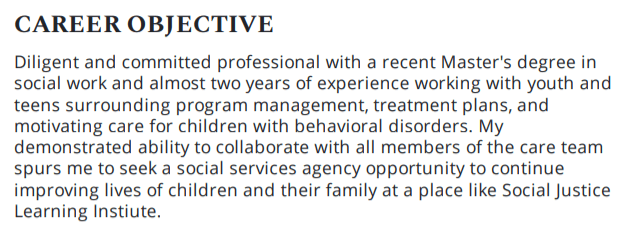

Work experience
You should be comprehensive, but use space wisely. Generally speaking, focus on recent jobs relative to the work you’re seeking: limit your positions to the last two to four jobs you’ve held. This provides enough space to give substantive details about your accomplishments.

Crafting your bullet points
Each bullet point in your social worker resume tells the story of your experience and qualifications. Make your bullet points effective by choosing active verbs that are specific to social work, using a consistent tense, and using sentence fragments without ending punctuation.
Examples of bullet points include:
- Taught kids drug abuse prevention techniques
- This uses a generic verb and provides no detailed insight into the client population.
- Worked on a project to streamline client records
- There is no information to describe the scope or extent of this achievement.
- Treated 30 patients per week
- This fails to highlight particular clinical skills or describe the client population.
- Facilitated weekly caregiver support sessions under the Hospital Support Network for a 12-member group to provide emotional support and coping strategies
- This specifies exactly what the applicant did and the community they served.
- Performed intake and psycho-social assessments for an average of 40 clients per week entering the outpatient program
- This highlights specific skills applicable to social work and quantifies their volume.
- Collaborated with nurses, discharge planners, and social workers to coordinate approximately 15 inpatient transitions to rehabilitation facilities
- This highlights a soft skill with an active verb and specifies the nature of the work.

Quantify your impact with numbers and statistics
Recruiters value statistics because they’re tangible proof of your performance and accomplishments. However, quantifying results in social work is difficult, and it doesn’t always reflect the humanistic nature of the practice. So, include metrics and statistics when you can, but don’t stress about including them in every bullet point. A good rule of thumb is to have 60 percent of your bullet points include metrics.
- Quantify your caseload to show the volume you’re accustomed to handling.
- Saw 25 clients weekly for CBT and check-ins
- Showcase program development within a specific budget or timeframe.
- Designed and implemented a revised onboarding system for new client intake with file integration in 6 weeks
- Include the documentation rate to show compliance and reimbursement standards.
- Completed and submitted necessary documentation tracking for patient reimbursement at a 100% conversion rate

Top social worker skills to mention
Social work positions require very specific skill sets, like particular diagnoses, treatment methods, and clinical theories. Review the job description carefully to see what skills they need for the position and thus, what you should include on your resume. Use these terms throughout your social worker resume (when they’re applicable) to catch the eye of any recruiter.
Top social work skills in 2025 include:
- Soft skills: Empathy, active listening, collaboration, critical thinking
- Clinical positions: CBT, evidence-based practice, intake, assessment, treatment planning, discharge
- Management/Oversight positions: Program development, community organizing, budgeting, compliance, supervision
Here’s a solid list of additional soft skills you might include:


Education, licenses, and specialized training
Listing your education reverse-chronologically is the best way for recruiters to see your most recent level of experience. Depending on your highest level of education, the section will descend from Ph.D. to MSW to BSW.
Be sure to list any licensures, continuing education certifications, or specialized training, either in the education section or in a separate licenses/certifications section.
If you still need licensure, there are an array of licenses available to those entering the social work field. While license requirements vary by state, most require a bachelo’rs degree. Candidates can earn certifications as a licensed social worker (LSW), a licensed independent social worker (LISW), a licensed clinical social worker (LCSW), or a licensed independent clinical social worker (LICSW) in most states.
Each level requires more education and training, with the LSW being the least demanding and LICSWs being the most stringent and intensive.
Notice the easy-to-read reverse-chronological style highlighting an evolving education.


Should you add projects, interests, or hobbies?
You should omit these optional sections unless you are a recent graduate or applying for an entry-level position. These sections provide color to your resume, but they’re generally considered excessive for higher-level positions. Highlighting and quantifying your professional accomplishments is far more important to recruiters.
If you choose to include hobbies on your resume, they should exhibit your suitability for the position. Social workers should also consider including relevant volunteer experience. If you’re applying for a school social work position, describing volunteer experience with a children’s literacy program would be more suitable than listing your participation in a food pantry.

Customize your resume to each job
Generic social worker resumes sent out for multiple jobs isn’t the way to go. Job postings are highly detailed and reflect the values and mission of their respective companies. As a result, you should tailor your resume directly to the open position.
Read job postings carefully to parse out the active verbs and terminology the recruiter will expect to see. You should check your social worker resume to ensure it mirrors their language and speaks directly to the company you wish to join.

Eliminate errors
Typos and grammatical errors can grab attention as much as an excellent objective statement or well-crafted bullet points. Always double-check your resume for grammar, punctuation, and spelling errors.
Ask relatives, friends, or classmates to review your social worker resume for misspellings, awkward phrasing, and punctuation errors.

Go land your next job!re
A resume that addresses your potential employer’s desired skills is your best chance to land an interview for your new social work position. While using a resume maker, be sure to:
- Strive for a logical and readable format that appeals to both recruiters and ATS
- Communicate your skills and achievements by highlighting how they directly relate to your desired position
- Quantify your performance whenever possible to show measurable achievements
- Customize your resume for each position to assure employers you are passionate about their business
When you’re ready to submit your resume to potential employers, it’s time to start learning how to write a resignation letter to plan a smooth exit from your current role and launch into your dream job.




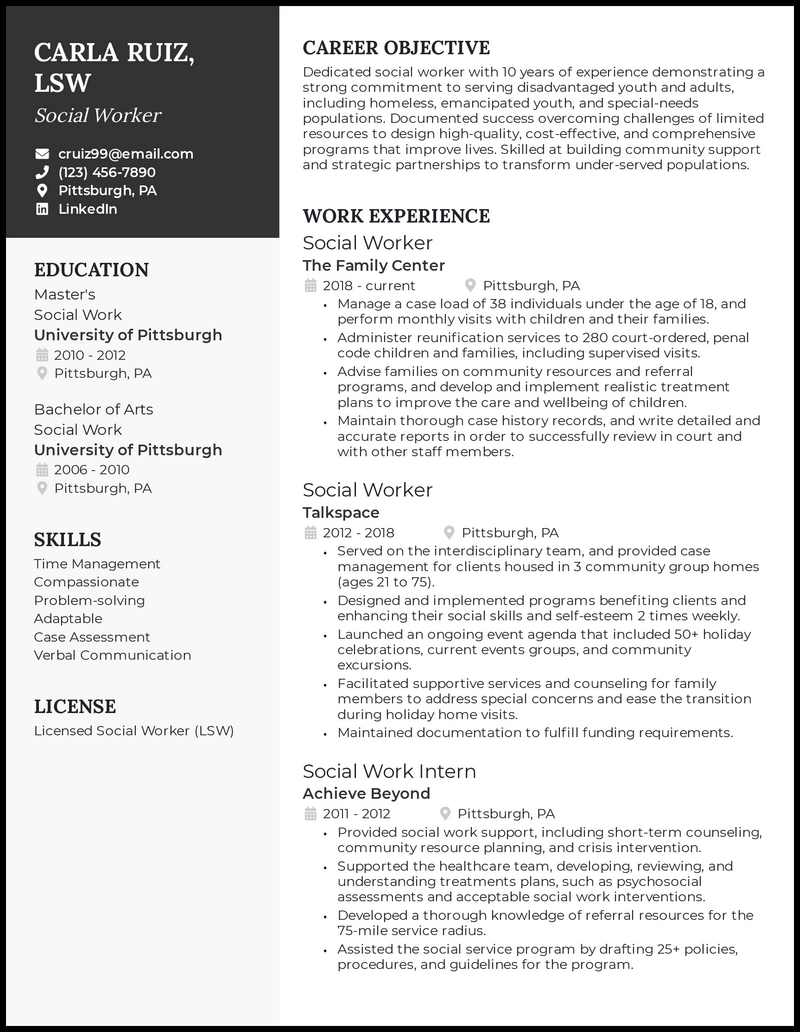


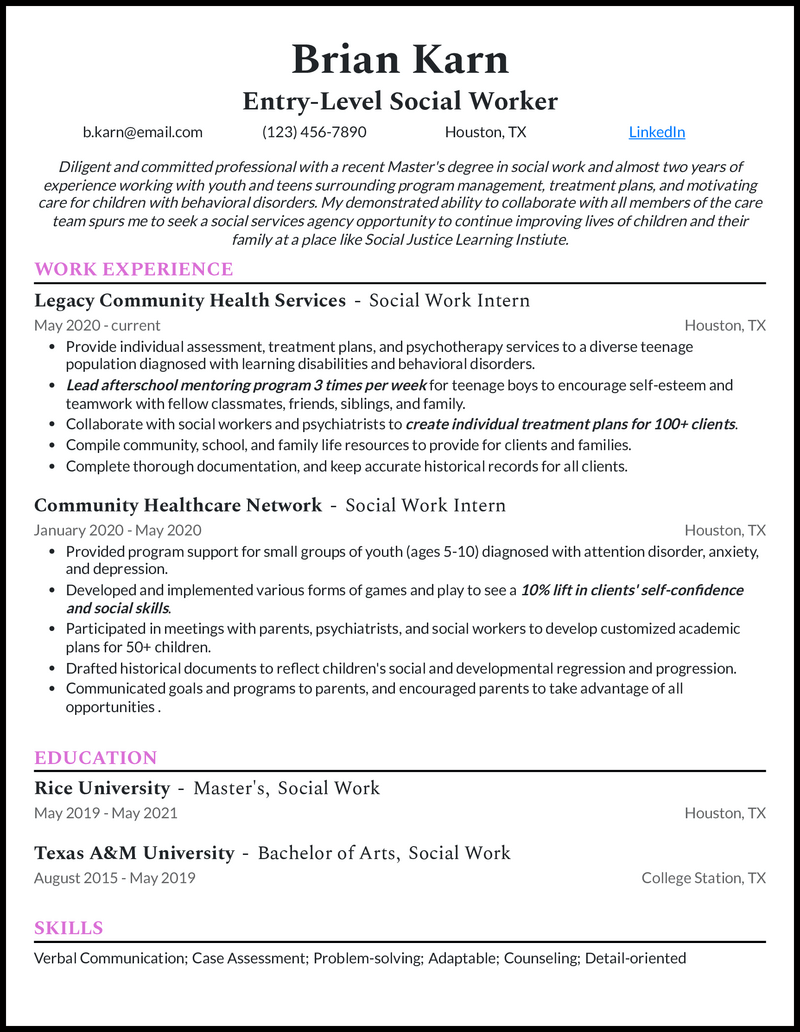
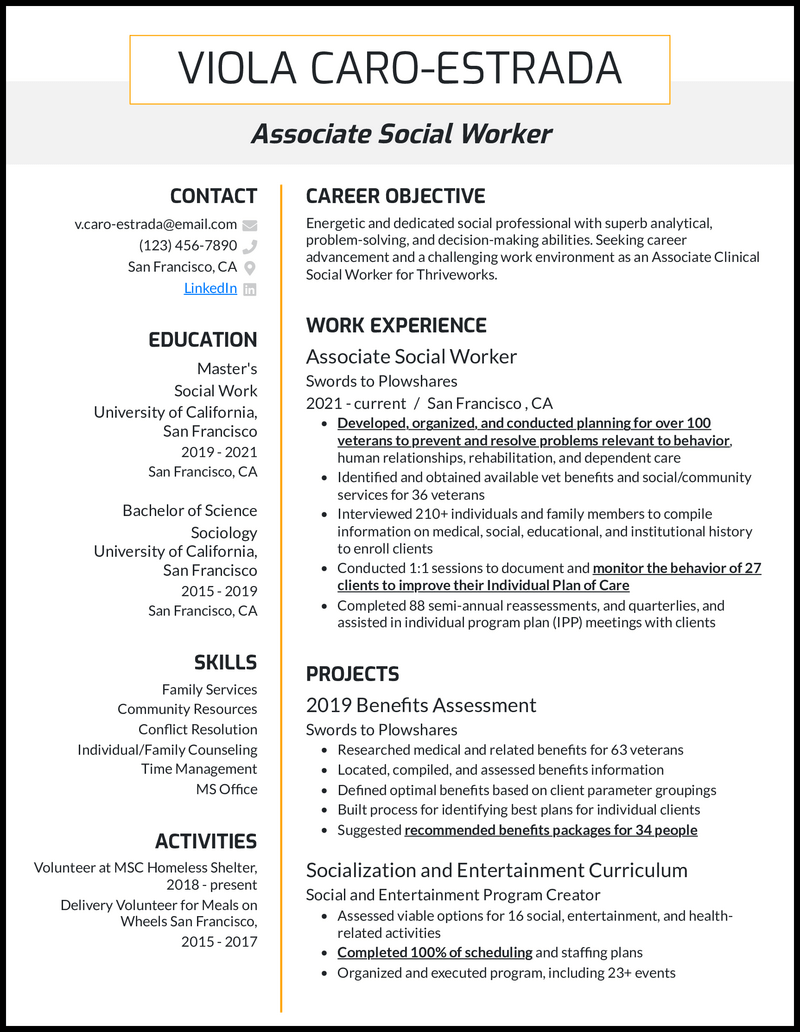


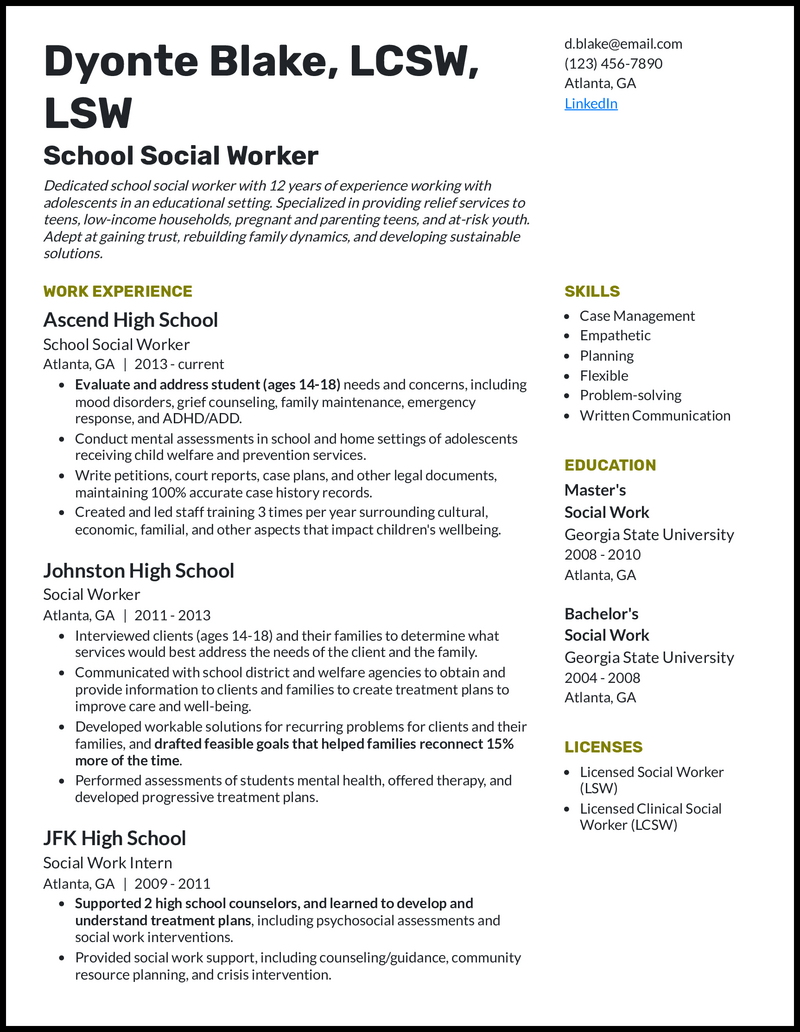
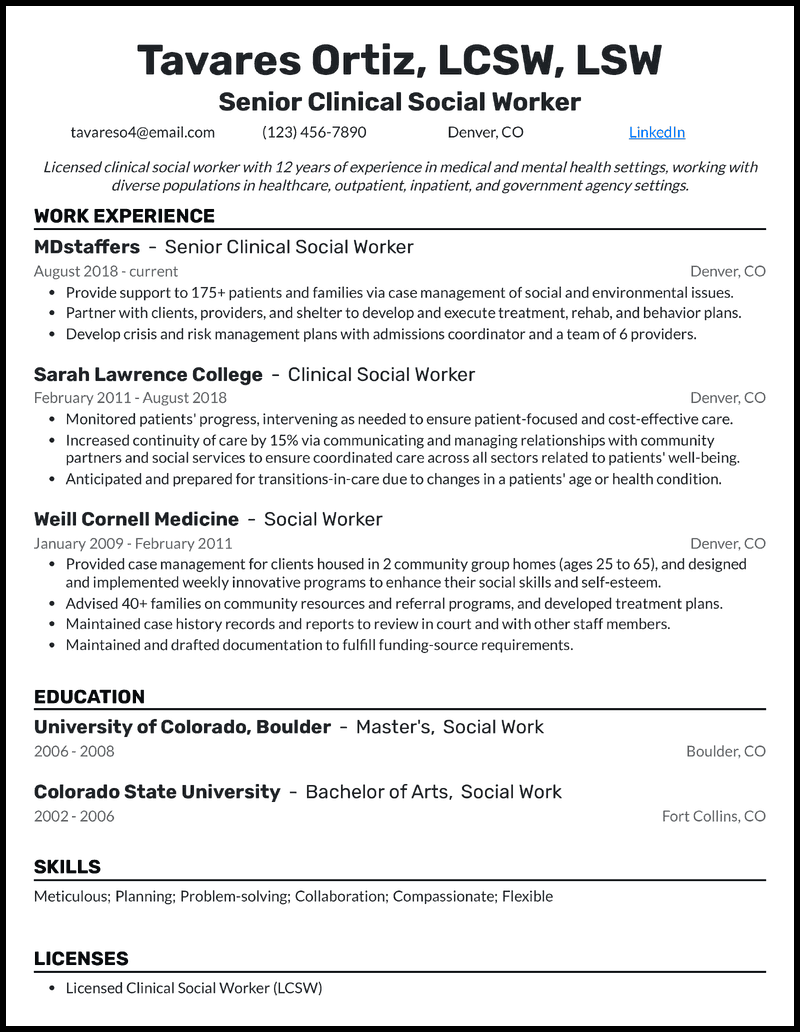
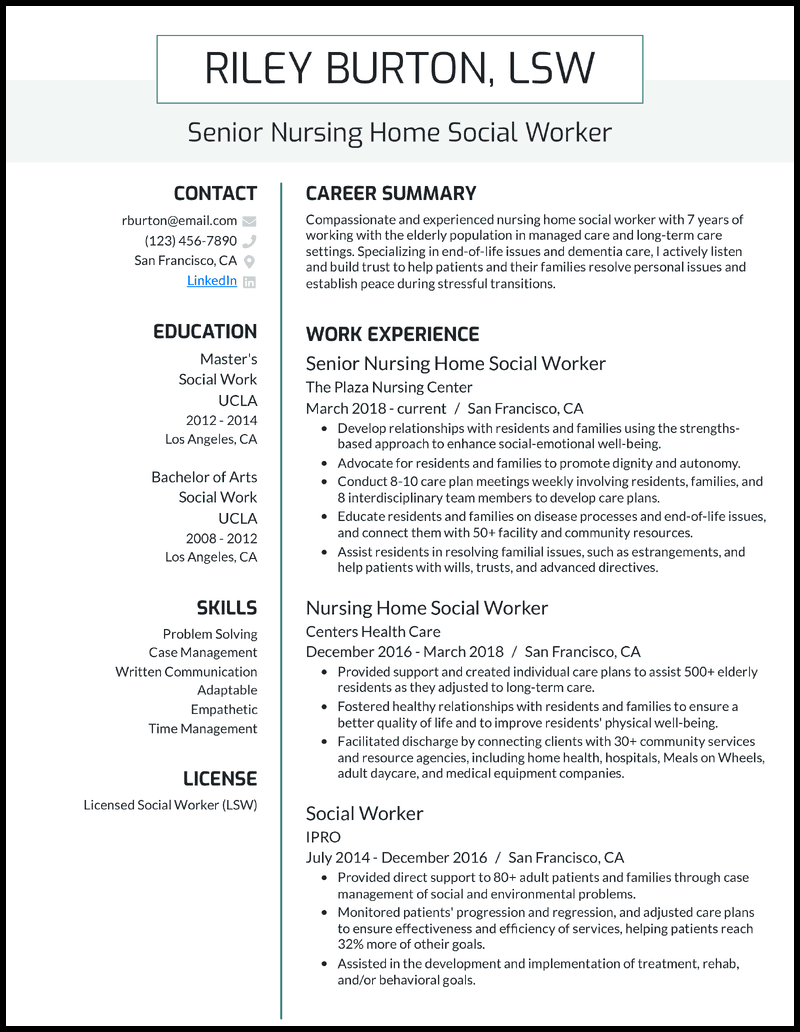
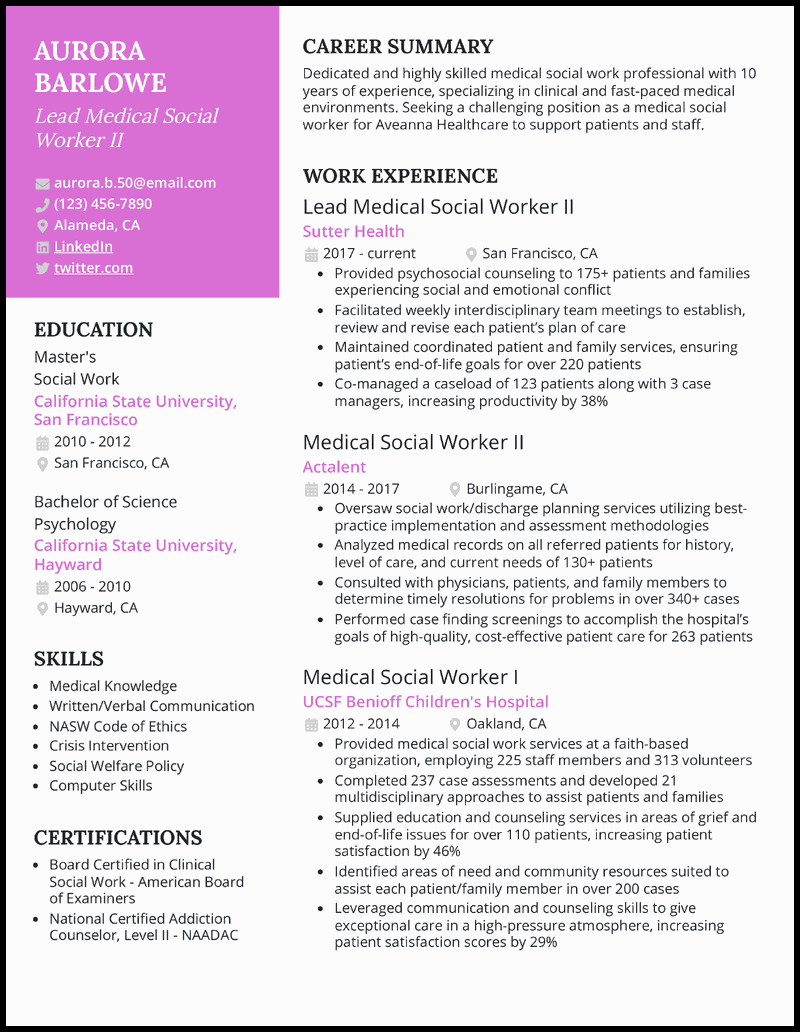

Social Worker Resume Example
or download as PDF
Why this resume works
It’s important to showcase any niche areas you’re familiar with in your work experience on your social worker resume.
Make sure to mention the facility settings where you’ve worked, whether it’s a hospital, school, rehabilitation center, group home, or community facility, so hiring managers see your expertise.
Social workers typically have high volumes of cases to manage, so you should highlight the number of cases you managed per day/week/month.
You can use your social worker resume skills section to ensure the hiring manager takes notice of any specialty areas with which you’re familiar.
If your case management included court documentation and appearance, be sure to discuss this in your social worker resume.